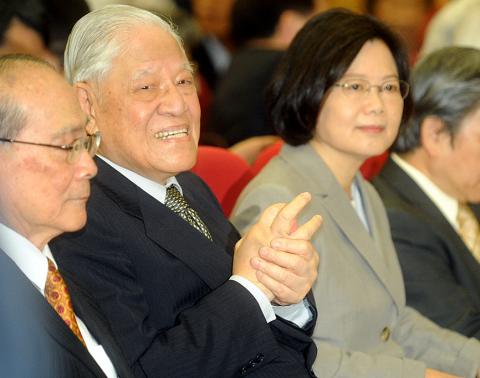Democratic Progressive Party (DPP) Chairperson Tsai Ing-wen (蔡英文) was noncommittal yesterday about constitutional reform, saying she would let the public fully discuss the issue and reach a consensus if she is elected president in January’s election.
Tsai, winner of the DPP’s recent three-way presidential primary, said it was important to deepen Taiwan’s democracy. To reach that goal, it was imperative to strengthen the governmental system, she added.
“I will let the public fully discuss the issue [of constitutional reform] if I’m elected,” she said on the sidelines of a forum held to mark the 20th anniversary of the abolition of the Temporary Provisions Effective During the Period of Communist Rebellion (動員戡亂時期臨時條款).

Photo: Wang Yi-sung, Taipei Times
“We will move on to the next stage if a consensus is reached. The most important thing is that the Taiwanese public must think about the issue, discuss it and come to a consensus,” she said.
Former president Lee Teng-hui (李登輝), who delivered the opening speech at the two-day forum hosted by Taiwan Advocates, the Taiwan Association of University Professors and three local think tanks yesterday, said the operation of the constitutional system in Taiwan was made possible after he nullified the temporary provisions in 1991.
The lifting of the temporary -provisions moved the country toward full elections for all legislative seats in 1992 and helped to bring about Taiwan’s first-ever direct elections for president in 1996.
The move also ended the civil war between the Chinese Nationalist Party (KMT) and Chinese Communist Party, he said.
“The direct presidential election in 1996 was a national referendum reflecting the free will of the Taiwanese people,” he said. “It is a serene revolution and it is not easy.”
Lee called on supporters to protect Taiwan’s democracy and reclaim power from the KMT in January’s presidential election, saying only solidarity would help reach the goal. He urged the public to have faith and that the goals of enacting a new constitution, rectifying the name of the country and becoming a normal country would eventually be realized.
Tsai, in her keynote speech, emphasized the importance of sustainable democracy.
Calling the annulment of the temporary provisions “a significant milestone of Taiwan’s development of democracy and national consciousness,” Tsai said it was ironic that President Ma Ying-jeou (馬英九) once vigorously opposed direct presidential elections, but he won the presidential poll in 2008.
The January elections are not only about the success or failure of individuals or competition between political parties, Tsai said, but about people having a say in the direction the nation takes and their expectations for democracy.
She proposed passing “sunshine laws,” to promote fair competition between political parties.
Government information must also be made more transparent, the referendum system made more reasonable and the thresholds for constitutional amendments lowered, she said.

US President Donald Trump yesterday announced sweeping "reciprocal tariffs" on US trading partners, including a 32 percent tax on goods from Taiwan that is set to take effect on Wednesday. At a Rose Garden event, Trump declared a 10 percent baseline tax on imports from all countries, with the White House saying it would take effect on Saturday. Countries with larger trade surpluses with the US would face higher duties beginning on Wednesday, including Taiwan (32 percent), China (34 percent), Japan (24 percent), South Korea (25 percent), Vietnam (46 percent) and Thailand (36 percent). Canada and Mexico, the two largest US trading

AIR SUPPORT: The Ministry of National Defense thanked the US for the delivery, adding that it was an indicator of the White House’s commitment to the Taiwan Relations Act Deputy Minister of National Defense Po Horng-huei (柏鴻輝) and Representative to the US Alexander Yui on Friday attended a delivery ceremony for the first of Taiwan’s long-awaited 66 F-16C/D Block 70 jets at a Lockheed Martin Corp factory in Greenville, South Carolina. “We are so proud to be the global home of the F-16 and to support Taiwan’s air defense capabilities,” US Representative William Timmons wrote on X, alongside a photograph of Taiwanese and US officials at the event. The F-16C/D Block 70 jets Taiwan ordered have the same capabilities as aircraft that had been upgraded to F-16Vs. The batch of Lockheed Martin

GRIDLOCK: The National Fire Agency’s Special Search and Rescue team is on standby to travel to the countries to help out with the rescue effort A powerful earthquake rocked Myanmar and neighboring Thailand yesterday, killing at least three people in Bangkok and burying dozens when a high-rise building under construction collapsed. Footage shared on social media from Myanmar’s second-largest city showed widespread destruction, raising fears that many were trapped under the rubble or killed. The magnitude 7.7 earthquake, with an epicenter near Mandalay in Myanmar, struck at midday and was followed by a strong magnitude 6.4 aftershock. The extent of death, injury and destruction — especially in Myanmar, which is embroiled in a civil war and where information is tightly controlled at the best of times —

China's military today said it began joint army, navy and rocket force exercises around Taiwan to "serve as a stern warning and powerful deterrent against Taiwanese independence," calling President William Lai (賴清德) a "parasite." The exercises come after Lai called Beijing a "foreign hostile force" last month. More than 10 Chinese military ships approached close to Taiwan's 24 nautical mile (44.4km) contiguous zone this morning and Taiwan sent its own warships to respond, two senior Taiwanese officials said. Taiwan has not yet detected any live fire by the Chinese military so far, one of the officials said. The drills took place after US Secretary